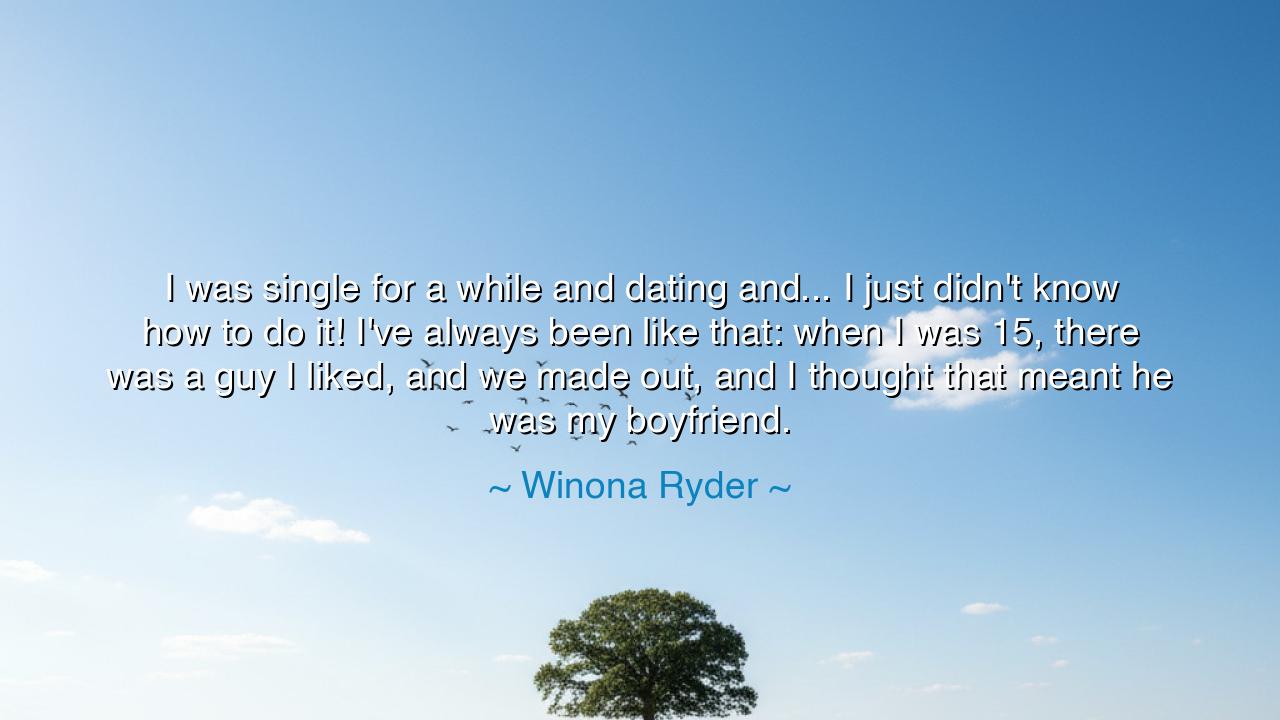
I was single for a while and dating and... I just didn't know how
I was single for a while and dating and... I just didn't know how to do it! I've always been like that: when I was 15, there was a guy I liked, and we made out, and I thought that meant he was my boyfriend.






The words of Winona Ryder—“I was single for a while and dating and... I just didn’t know how to do it! I’ve always been like that: when I was 15, there was a guy I liked, and we made out, and I thought that meant he was my boyfriend”—speak with the tender honesty of one who has learned that love, in the modern world, is both a mystery and a maze. Beneath their simplicity lies the eternal confusion of the heart, that ancient force which has confounded kings and poets alike. In this confession, Ryder reveals not ignorance, but innocence—the yearning of a soul that believes in connection deeper than the fleeting customs of her age.
Her words echo the timeless ache of all who have entered love’s realm unguarded and sincere. To “not know how to do it” is to feel adrift in a world where affection has become performance, where tenderness is often weighed against pride, and sincerity mistaken for weakness. Yet what Ryder expresses is not foolishness—it is purity. It is the longing to return to a simpler time, when love meant loyalty, when a single gesture, a kiss, a promise of closeness, carried the sacred weight of commitment. She reminds us that though the world grows more complex, the human heart remains ancient—still seeking truth beneath the glitter of modern romance.
In the days of the ancients, love was treated as both art and trial. The Greeks told of Psyche, whose pure heart drew the god of love himself, Eros. Yet her innocence led her through torment and doubt, for love, though divine, requires wisdom to endure. Like Psyche, Winona Ryder’s words carry the innocence of one who believes that affection alone can sustain love—but the world teaches otherwise. The ancients knew that love demands not only emotion, but also understanding: the patience to discern the difference between desire and devotion, between affection that flickers and affection that endures.
Her reflection also speaks to the loneliness of modern love, where the rituals of courtship have grown uncertain, and the meaning of intimacy has blurred. To many, a moment of closeness no longer signifies a bond; the gestures once sacred have become casual. Ryder’s confusion is not hers alone—it belongs to an age that has lost the map of its own emotions. Yet her honesty is a lantern in that fog, reminding us that vulnerability is not naivety, and that to feel deeply, even in error, is better than to feel nothing at all.
Consider the story of Jane Austen’s characters, especially that of Marianne Dashwood in Sense and Sensibility. Young and romantic, Marianne believed that a man’s glance, his poetry, and his kiss were proofs of eternal love. When Willoughby betrayed her trust, she nearly lost her life to heartbreak. But through pain, she grew wise—learning that love must be built not on assumption, but on mutual understanding and integrity. Marianne’s journey mirrors the truth in Ryder’s words: that the heart’s greatest lessons are often learned through its own bewilderment.
There is both humility and courage in Ryder’s confession. To admit “I didn’t know how to do it” is to recognize that love, unlike skill or art, cannot be mastered—it must be lived, felt, and sometimes suffered through. It is an apprenticeship of the soul. Each encounter, each disappointment, each misunderstanding becomes a teacher, guiding us toward a more authentic understanding of affection. The one who feels deeply may stumble often, but she walks closer to truth than the one who loves with calculation.
From her words, we draw a lesson both gentle and powerful: do not be ashamed of your innocence in love. The world may mock purity as foolishness, but it is the seed from which real devotion grows. Be honest in your affection, even if it makes you uncertain. Let your heart be kind, even when others are careless. And when love confuses you, as it surely will, remember that to love at all is to step into the unknown with trembling faith. For it is better, as the ancients taught, to be wounded by sincerity than to remain untouched by fear.
So let us live as Winona Ryder once spoke—with hearts unarmored, learning not how to perform love, but how to be true within it. Let us reclaim the sacredness of feeling, the humility of not knowing, and the quiet courage to still believe. For though the world may forget the meaning of a kiss, the soul never does—and somewhere, beneath all our confusion, the heart still whispers the oldest truth of all: to love is to return home to oneself.






AAdministratorAdministrator
Welcome, honored guests. Please leave a comment, we will respond soon